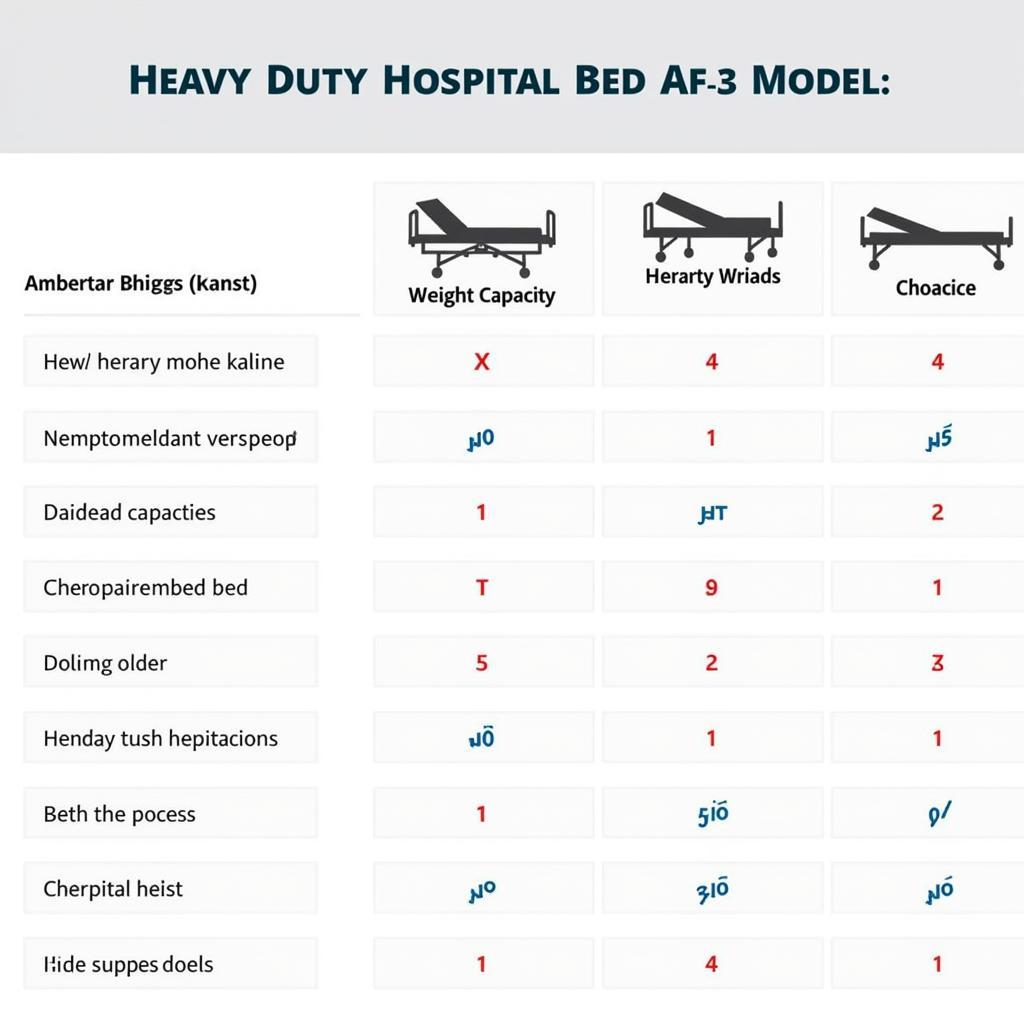Heavy Duty Hospital Beds are essential for providing comfort and care to patients with specific medical needs. Unlike standard hospital beds, these robust models are designed to accommodate higher weight capacities and often incorporate additional features for enhanced patient safety and mobility. If you’re in the process of selecting a heavy duty hospital bed, whether for a healthcare facility or home care setting, this guide will equip you with the information you need to make an informed decision.
Understanding the Importance of Heavy Duty Hospital Beds
Heavy duty hospital beds cater to a diverse range of patients, including those who:
- Are bariatric: These beds provide the necessary weight capacity and stability for larger individuals, ensuring their safety and comfort.
- Have limited mobility: Features like adjustable height, side rails, and integrated bedpan holders assist patients with movement limitations.
- Require specialized medical care: Some heavy duty beds come equipped with attachments for traction, wound care, and other medical interventions.
Investing in a heavy duty hospital bed contributes significantly to improved patient outcomes by reducing the risk of falls, pressure ulcers, and caregiver injuries.
Key Factors to Consider When Choosing a Heavy Duty Hospital Bed
Weight Capacity and Construction
 Heavy Duty Hospital Bed Weight Capacity Chart
Heavy Duty Hospital Bed Weight Capacity Chart
The most crucial aspect to consider is the bed’s weight capacity. This should comfortably exceed the patient’s weight to ensure safety and prevent equipment failure. Look for beds constructed from sturdy materials like steel with reinforced frames for added durability.
Features for Patient Comfort and Safety
- Adjustable Height: Electric height adjustment allows caregivers to easily reposition patients and facilitates transfers to and from the bed, minimizing strain on both parties.
- Side Rails: Full-length or half-length side rails provide added security, preventing falls and assisting with patient movement within the bed.
- Mattress Options: Select a mattress designed for heavy duty use, offering pressure redistribution and optimal support for larger body types.
Additional Features for Enhanced Care
- Trendelenburg and Reverse Trendelenburg Positioning: These features allow for head-down or head-up bed tilting, aiding in respiratory care or improving blood circulation.
- Bed Exit Alarm: An alarm system that sounds when a patient attempts to get out of bed unassisted, enhancing safety and enabling timely intervention.
Making Your Decision: Factors Beyond the Bed Itself
Ease of Use for Caregivers
Consider the ease of operation for caregivers. Features like intuitive controls, easy-to-maneuver casters, and ergonomic design can significantly impact the caregiver’s ability to provide efficient care.
Budgetary Considerations
 Comparing Heavy Duty Hospital Bed Prices
Comparing Heavy Duty Hospital Bed Prices
Heavy duty hospital beds vary in price depending on their features and functionality. Determine your budget and prioritize features that align with your specific needs.
Maintenance and Durability
Opt for a bed with a durable finish that is easy to clean and disinfect. Check the warranty coverage and inquire about the availability of replacement parts.
Conclusion
Selecting the right heavy duty hospital bed is a significant decision that directly impacts patient well-being and quality of care. By carefully considering the factors outlined in this guide, you can make an informed choice that prioritizes safety, comfort, and overall patient satisfaction. Remember to consult with healthcare professionals and equipment specialists to determine the most suitable bed for your specific requirements.
FAQs
1. What is the typical weight capacity of a heavy duty hospital bed?
Heavy duty hospital beds are designed to accommodate a wide range of weights, typically starting from 500 pounds and going up to 1000 pounds or more.
2. Are heavy duty hospital beds covered by insurance?
Insurance coverage for heavy duty hospital beds varies depending on your specific insurance plan and medical necessity. It is essential to check with your insurance provider for coverage details.
3. Can heavy duty hospital beds be used in a home care setting?
Yes, heavy duty hospital beds can be used in home care settings to provide a safe and comfortable environment for patients requiring specialized care.
4. What is the average lifespan of a heavy duty hospital bed?
With proper maintenance and care, a high-quality heavy duty hospital bed can last for several years.
5. Can I rent a heavy duty hospital bed instead of purchasing one?
Yes, heavy duty hospital beds are available for rent from medical equipment suppliers. Renting can be a cost-effective option for short-term needs.
Need further assistance in choosing the right heavy duty hospital bed? Contact us at Phone Number: 02437655121, Email: [email protected], or visit us at Address: 298 Cau Dien Street, Minh Khai, Bac Tu Liem, Hanoi, Vietnam. Our 24/7 customer support team is ready to help you. You can also find more information on our website, including details about Fairview Park Hospital Dublin GA Jobs.